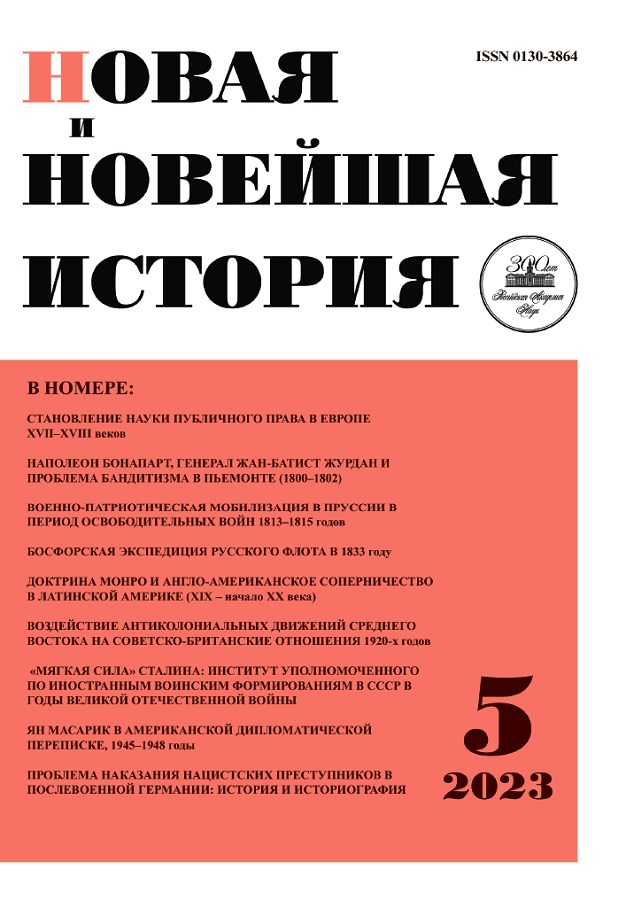Nº 5 (2023)
- Ano: 2023
- Artigos: 22
- URL: https://snv63.ru/0130-3864/issue/view/12343
Edição completa
Theory and methodology of history
Making of the Science of Public Law in Europe
Resumo
 5-17
5-17


The Problem of Punishment for Nazi Criminals in the Post-War Germany: History and Historiography
Resumo
 18-33
18-33


Modern history
Napoleon Bonaparte, General Jean-Baptiste Jourdan, and the Problem of Banditry in Piedmont, 1800–1802
Resumo
The Consulship of Napoleon Bonaparte is often presented as a time of his political triumph as both politician and legislator. However, this very stereotypical assessment requires further clarifications. As the latest research suggests, the whole period between the Brumaire and the proclamation of the Empire was a period of difficult search for new methods of governance under very difficult circumstances. One of the serious problems in the formation of the new borders of Napoleonic France in the early years of the nineteenth century continued to be banditry (brigandage). In a number of regions, this phenomenon had a distinct political colouring. In the French political lexicon of the era, it referred to collective violence of any kind, anti-state actions, as well as various forms of criminal robbery. The situation was most acute in the peripheral regions, particularly in Piedmont. Although the flames of the acute civil conflict of 1799 had subsided here, yet the causes of this mass phenomenon were extremely deep. The author aims to analyse the ways of solving the problem of banditry in the context of the overall Napoleonic policy, to show the role of the French administration and, in particular, of General Jean-Baptiste Jourdan in this process during the formation of new institutions of power in the Consulate period. Drawing on the archival collections of the French Ministries of General Police and Justice, the Piedmont General Administration from the French National Archives, as well as some materials from the archival collections of the French Ministry of Foreign Affairs, he attempts to reconstruct a set of measures to eradicate banditry. The new authorities, and above all the chief administrator of Piedmont, General Jourdan, as well as the prefects and mayors, had to resort both to the tactics of “mobile columns” and extraordinary justice, but also to seek compromise with the rural oligarchy, the parish clergy and the peasant masses in order to maintain the fragile social order. What is also significant is that the experience gained by the French in the fight against banditry in Piedmont was later successfully disseminated to other regions of Italy, and that it was this experience that largely served as the basis for the formation of Napoleon's policy of “cultural imperialism”.
 34-47
34-47


Military and Patriotic Mobilisation in Prussia During the Liberations Wars of 1813–1815
Resumo
 48-61
48-61


The 1833 Bosporus Expedition of the Russian Fleet
Resumo
 76-86
76-86


The Unmasking of the “Second Kotzebue”: Background to a Spy Scandal 1831
Resumo
 62-75
62-75


20th century
The Monroe Doctrine and Anglo-American Rivalry in Latin America, 19th – early 20th centuries
Resumo
 87-98
87-98


Fleet Support to the Army Offensive on the Caucasus Front in 1916
Resumo
 99-110
99-110


The Impact of Anti-Colonial Movements in the Middle East upon the Soviet-British Relations in the 1920s
Resumo
 111-123
111-123


Stalin's “Soft Power”: Activities of the Commissioner for Foreign Military Formations in the USSR During the Great Patriotic War
Resumo
 124-143
124-143


Jan Masaryk in American Diplomatic Correspondence, 1945–1948
Resumo
 144-157
144-157


Chanceler Adenauer’s the Theory of Crises of the USSR
Resumo
 158-171
158-171


The DPRK and Cuba in the Initial Period of Bilateral Relations (1960–1965): The Limits of “Socialist Solidarity”
Resumo
 172-183
172-183


Messages
Jean-Lambert Tallien and his Political Path
Resumo
 184-197
184-197


“Abhorrent Zionism, Israel are not the Solution”: Dialectics of the Soviet and the National in Ego-Documents of the 1970s–80s
Resumo
 198-215
198-215


Why There Is No Socialism in the USA
Resumo
 216-229
216-229


Reviews
 230-233
230-233


 233-237
233-237


 238-245
238-245


 245-249
245-249


Academic life
 250-252
250-252


 253-254
253-254












